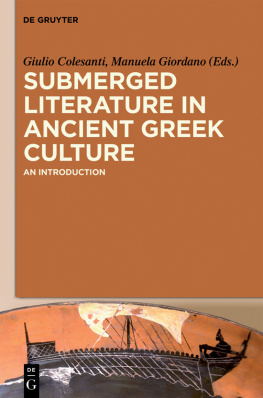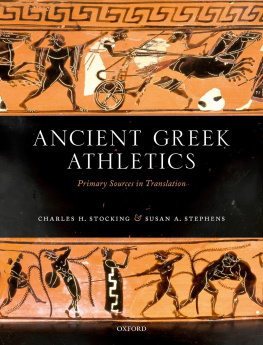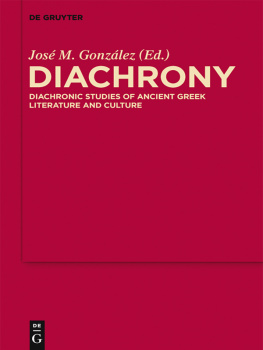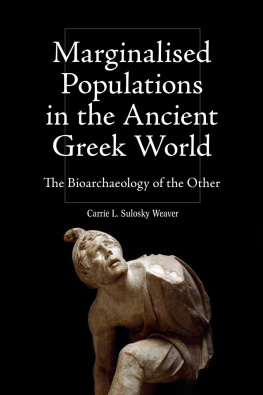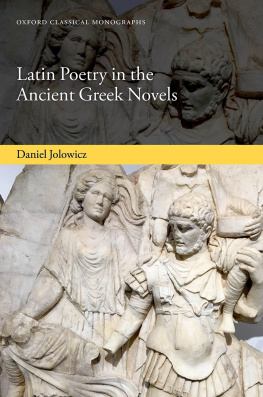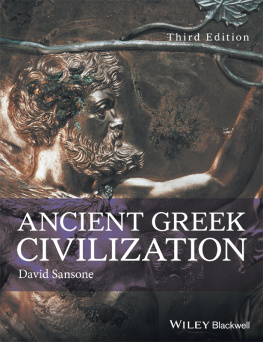Colesanti - Submerged Literature in Ancient Greek Culture
Here you can read online Colesanti - Submerged Literature in Ancient Greek Culture full text of the book (entire story) in english for free. Download pdf and epub, get meaning, cover and reviews about this ebook. year: 2014, publisher: De Gruyter, genre: Religion. Description of the work, (preface) as well as reviews are available. Best literature library LitArk.com created for fans of good reading and offers a wide selection of genres:
Romance novel
Science fiction
Adventure
Detective
Science
History
Home and family
Prose
Art
Politics
Computer
Non-fiction
Religion
Business
Children
Humor
Choose a favorite category and find really read worthwhile books. Enjoy immersion in the world of imagination, feel the emotions of the characters or learn something new for yourself, make an fascinating discovery.
Submerged Literature in Ancient Greek Culture: summary, description and annotation
We offer to read an annotation, description, summary or preface (depends on what the author of the book "Submerged Literature in Ancient Greek Culture" wrote himself). If you haven't found the necessary information about the book — write in the comments, we will try to find it.
Colesanti: author's other books
Who wrote Submerged Literature in Ancient Greek Culture? Find out the surname, the name of the author of the book and a list of all author's works by series.
Submerged Literature in Ancient Greek Culture — read online for free the complete book (whole text) full work
Below is the text of the book, divided by pages. System saving the place of the last page read, allows you to conveniently read the book "Submerged Literature in Ancient Greek Culture" online for free, without having to search again every time where you left off. Put a bookmark, and you can go to the page where you finished reading at any time.
Font size:
Interval:
Bookmark:
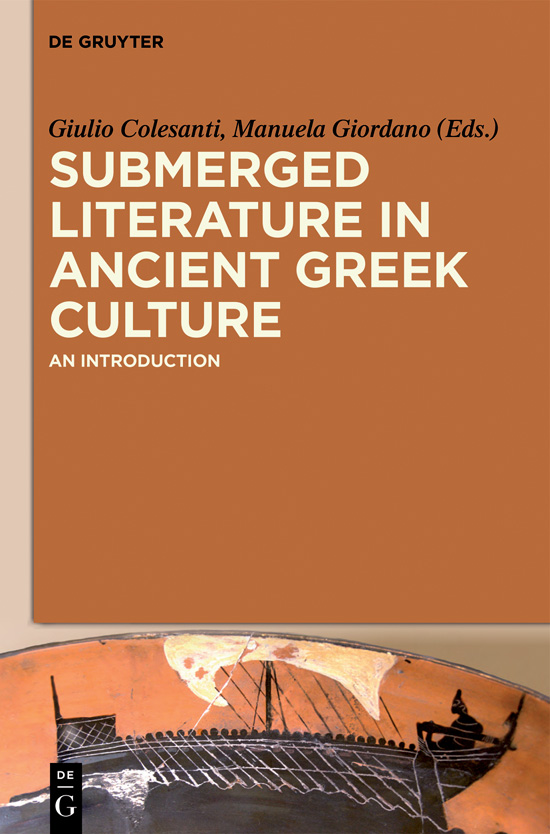
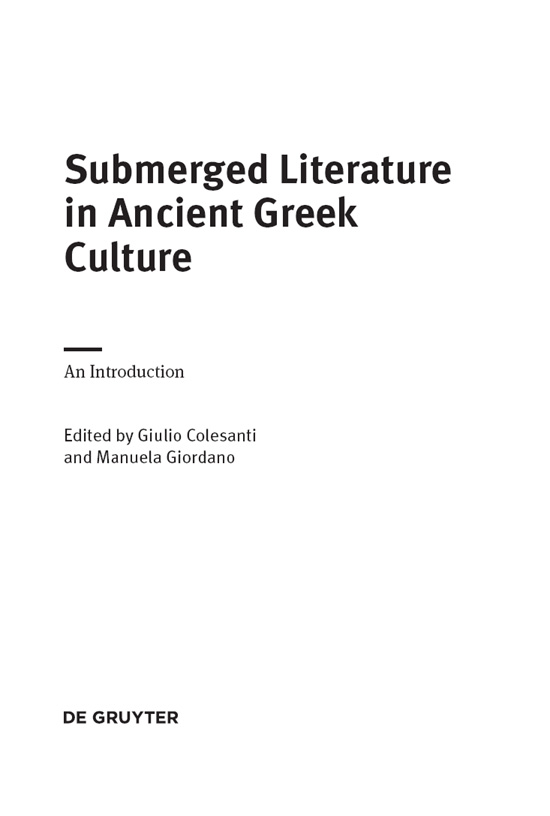
The book was published with the support of the project PRIN 2010-2011
Trasmissione dellantico: codificazione letteraria, tradizione manoscritta, ricezione, funded by the Italian Ministry for Education, University and Research
(MIUR Ministero dellIstruzione, Universit e Ricerca).
ISBN 978-3-11-033396-1
e-ISBN (PDF) 978-3-11-033408-1
e-ISBN (ePub) 978-3-110390-20-9
Library of Congress Cataloging-in-Publication Data
A CIP catalog record for this book has been applied for at the Library of Congress.
Bibliographic information published by the Deutsche Nationalbibliothek
The Deutsche Nationalbibliothek lists this publication in the Deutsche Nationalbibliografie; detailed bibliographic data are available in the Internet at http://dnb.dnb.de.
2014 Walter de Gruyter GmbH, Berlin/Boston
www.degruyter.com
Epub-production: Jouve, www.jouve.com
Alla cara memoria di Luigi Enrico Rossi
This volume is dedicated to Luigi Enrico (Chico) Rossi (19332009), inspiring and devoted teacher, who taught Greek literature at the University of Rome La Sapienza with relentless enthusiasm and founded a thriving forty year tradition of seminars.
We would like to thank all the contributors to this volume for having supported our endeavour with trust and encouragement; particular thanks to Andrea Ercolani, who has the merit of having proposed the theme of submerged literature for a series of seminars.
We are very grateful to Bar Zecharya: this volume owes much to his generosity in finding time for reading, commenting, and improving it. We wish to thank Bob Fowler for his valuable suggestions.
We should also like to express our thanks to Serena Pirrotta, Florian Ruppenstein, and Johanna Wange of de Gruyter, who have followed this volume with great attention throughout its different stages.
G. C. and M. G.
All translations in this volume are by Mattia Bilardello, except for: Introductory Notes (English original by Manuela Giordano), Submerged Literature in an Oral Culture (trans. Richard Bates), Beyond the Canon: Hellenistic Scholars and Their Texts (English original by the author), Comedy outside the Canon: from Ritual Slapstick to Hellenistic Mime (trans. by Anita J. Weston), Out of Athens. Ritual Performances, Spaces, and the Emergence of Tragedy (English original by the author), By Way of Conclusion (trans. by Mattia Bilardello, Manuela Giordano, Anita J. Weston). The final editing of the English text is by Mattia Bilardello with the assistance of Anita J. Weston.
Giulio Colesanti, Manuela Giordano
The theme and definition of submerged literature stems from the writings of the late Luigi Enrico Rossi, common teacher to most contributors to this volume. In particular, in a set of unpublished notes from 1995, Rossi proposed
to initiate a recensio of that part of Greek literature which never received publication (although this description is inaccurate for anything predating the fourth century BCE: which never received poly-centric distribution, we may better say). Literature of this kind never enjoyed the protection of either the polis or any other authority with institutionalized let us say literary credentials.
Rossi stimulated a discussion of this idea among his pupils and in 2000 published a paper with a few pages dedicated to the subject, where submerged literature served as a label encompassing mainly those texts that were not protected during their transmission by social contexts and institutions and were therefore excluded by the circuits of transmission, but that can nonetheless be reconstructed. Luigi Enrico Rossi did not develop his project any further.
As an ideal continuation of his project, a research group of Rossis pupils
This is not to say literature should be altogether dispensed with as a conventional term of reference, although one should be aware of the potential misapprehensions resting with a notion that is ill-suited to represent a properly emic point of view.
As a working definition, we propose to understand literature for the purposes of this volume as a concept covering the whole range of texts produced for a socially relevant occasion; that is, all the texts that contributed to configure and articulate Greek culture as we know it from written and material sources, with the additional proviso that the term literature be used as a non-evaluative term. This definition implies a reassessment of the term literature and its extension to include, alongside preserved and lost texts, those texts we may reconstruct circumstantially, by way of investigation, regardless of their having been conceived for transmission. In this respect, reflecting upon submerged literature may provide a new way and a new model to understand texts and cultural history. Within the scope of submerged literature we may therefore take into account texts ranging from the religious to the legal or anthropological domains, from forensic speeches to choral odes, from mystery cult texts to lullabies. This does not mean that the term literature, under this definition, can be foisted upon any variety of distinct textual types: in our perspective, on the contrary, whether a certain text is a literary text is no longer an informative question; our assumption, rather, is to regard Ancient Greek texts as a unified and interrelated province.
This book, moreover, reflects an approach to Greek texts as context rather than text, that cropped up early on in our investigation, an approach that bestows primacy to occasion and hence performance, and follows the lead of a In this direction, the investigation on submerged literature endeavours to tackle the occasions as well as the contexts, the spaces, and the conditions of transmission and diffusion of Ancient Greek texts, benefiting from anthropological and archeological hermeneutics as well. The picture that we offer in this volume criss-crosses dynamics of synchrony and diachrony, and explores the twilight area dividing lost and submerged texts. The essays contained here deal with questions of hermeneutics, philology and methodology as well as with epic Cycles, lyric poetry, tragedy, comedy, satyr play, and mime. In dealing with these genres from the point of view of submerged literature, the book attempts to provide a more precise contextualization of the texts in the ancient Greek system of communication and performance, mapping those texts individually and by typology together with the occasions of their performance.
This volume is a collaborative and shared work, as it sprouts from continual, intense, and rewarding discussions of the research group: each paper has been thoroughly discussed, scrutinized and commented upon in informal meetings by all the contributors to this volume. In this respect the volume rather represents a common undertaking than a set individual achievements, leading to final conclusions bearing the authorship of the entire research group.
This climate of lively and engaged scholarly conversations as well as the practice of putting es meson the issues at stake is the beautiful and standing legacy of our teacher, who often remarked that discussion is the essential part of any seminar.
The volume intends to encourage further extensive investigation that will hopefully foster a new understanding of ancient Greek culture and envisage its unique dynamics of orality and literacy under a new hermeneutic frame. To be sure, this first volume cannot aspire to completeness: it is our aim to pursue a more thorough treatment of the subject, from different angles, in two forthcoming volumes of the series we here inaugurate. It should at this point be apparent that the objective of this first stage in the research was to state a case (albeit broadly framed), rather than to supply all of the answers.
Font size:
Interval:
Bookmark:
Similar books «Submerged Literature in Ancient Greek Culture»
Look at similar books to Submerged Literature in Ancient Greek Culture. We have selected literature similar in name and meaning in the hope of providing readers with more options to find new, interesting, not yet read works.
Discussion, reviews of the book Submerged Literature in Ancient Greek Culture and just readers' own opinions. Leave your comments, write what you think about the work, its meaning or the main characters. Specify what exactly you liked and what you didn't like, and why you think so.

